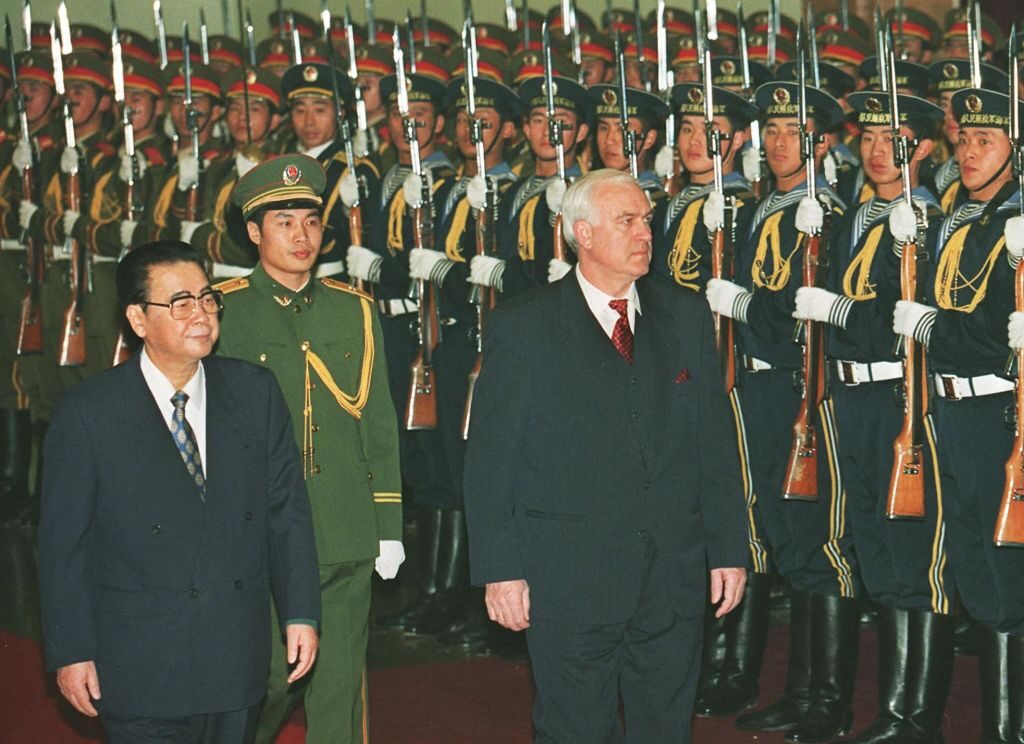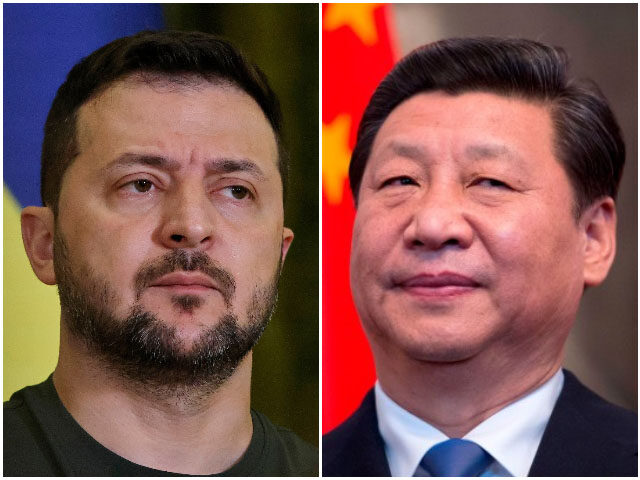Ukraine’s ambassador to Beijing told the Chinese Foreign Ministry on Monday that Kyiv is “committed to the one-China principle,” which denies the existence of the state of Taiwan and falsely asserts the sovereign nation is a province of communist China.
Ambassador Pavlo Riabikin reportedly made the statement in a meeting with Chinese Vice Foreign Minister Sun Weidong in Beijing, according to a readout published by the Chinese Foreign Ministry.
The Ukrainian government has spent much of the two years following Russia’s invasion of its territory attempting to convince China, Moscow’s closest ally, to change allegiances and support Ukraine – or at least help rebuild the cities devastated by the Russian assault. Ukraine is a formal member of China’s Belt and Road Initiative (BRI), a global debt trap plan in which Beijing offers predatory loans to vulnerable countries meant to be used to pay Chinese companies for infrastructure projects.
Its president, Volodymyr Zelensky, has repeatedly attempted to establish consistent communication with Chinese dictator Xi Jinping and urged him to dissuade strongman Vladimir Putin from continuing his onslaught against Ukraine.
On the international stage, Ukraine has failed to condemn China’s extensive human rights violations, including the genocide of the majority-Muslim Uyghur people and continued occupation of East Turkistan, and fallen silent for years on Beijing’s increasingly belligerent threats against Taiwan.
Kyiv’s attempts to court China have largely failed. Putin made his first international trip after being charged with war crimes at the International Criminal Court (ICC) in 2023 to China, enjoying a red-carpet welcome from Xi. China has called for “peace” in Ukraine generally but not condemned Russia for starting the war by invading Ukraine – nor called for Russia to withdraw its troops.
The Zelensky administration appears to be continuing its overtures to China, however, as it sent its ambassador to discuss the issue with the Chinese Foreign Ministry.
According to Beijing, Riabikin, the Ukrainian ambassador, said “Ukraine attaches great importance to developing relations with China and stays committed to the one-China principle.”

File/Ukrainian Prime Minister Valery Pustovoitenko accompanied by his Chinese counterpart Li Peng (L) as they inspect a guard-of-honour during a welcoming ceremony in Beijing 22 December, 1997. Pustovoitenko arrived for a four-day official visit to China. (AFP via Getty Images)
“Ukraine is ready to strengthen exchanges and cooperation with China and push for the constant development of bilateral relations,” the Foreign Ministry added.
Vice Foreign Minister Sun Weidong reportedly told the ambassador in the same exchange that “China and Ukraine should take a long-term view, respect each other and treat each other with sincerity to promote the steady and long-term development of bilateral relations.” The readout did not elaborate on what, specifically, this would require, but said Sun ominously warned that “changes unseen in a century are accelerating.”
The South China Morning Post noted the meeting happened on “the same day China and Russia held their first talks of the year, in Moscow,” suggesting that Beijing is still prioritizing its relationship to Russia and unlikely to defend Ukraine despite its formal status as a diplomatic friend.
Contrary to the “one-China principle,” Taiwan is a sovereign nation with no political ties to China and has never been governed by a regime headquartered in Beijing. It enjoys a free, democratic system and independent institutions such as a military, judiciary, and bureaucracy totally independent from the Chinese Communist Party. Taiwan struggles to gain international recognition, however, due to the Communist Party refusing to maintain any diplomatic tie with a country that recognizes the reality of Taiwanese sovereignty.
Currently, only 12 nations in the world recognize Taiwan. America is not among them.
Taiwan donated 27 metric tons of medical supplies to Ukraine in March 2022, the second month of the full-scale Russian invasion, and sent a round of power generators to Ukraine to help protect civilians from Russian attacks on the power grid in January 2023.
Zelensky’s Ukraine has not maintained an official relationship with Taiwan but has allowed some exchanges. Zelensky himself also appeared to support Taiwan in statements made in June 2022, in which he called for the world to help fortify Taiwan from a Chinese invasion before it occurred.
“We must not leave them behind at the mercy of another country which is more powerful in financial terms, in territorial terms and in terms of equipment,” Zelensky told the Washington Post, referring to endangered nations generally. “And therefore, if there is a way out diplomatically, we need to use the diplomatic way. But it must be a preemptive way, not the one that comes after the war has started.”
Zelensky has much more enthusiastically called for Chinese involvement in mediating the Russian invasion and in post-war reconstruction.
“It’s a very powerful state. It’s a powerful economy … So (it) can politically, economically influence Russia. And China is [also a] permanent member of the U.N. Security Council,” Zelensky told the South China Morning Post in August 2022, urging Xi to speak to him directly and asking “Chinese businesses” to rebuild Ukraine.
Zelensky got his phone call with Xi in April 2023, which the Ukrainian leader celebrated as “long and meaningful.” Xi reportedly told Zelensky that China had a “consistent and clear” will to improve relations with Ukraine and offered, “Mutual respect for sovereignty and territorial integrity is the political foundation of the bilateral ties.”
The talks resulted in China sending a “special representative” to tour Western Europe – former ambassador to Russia Li Hui – to promote a Chinese “peace plan” for a “political settlement” in Ukraine. The plan consisted of China lecturing both countries to “calm down as soon as possible,” with few other details. Both Kyiv and Moscow largely ignored it.
Zelensky is reportedly attempting to convince Xi to attend a “peace summit” he is attempting to organize in Switzerland, according to the South China Morning Post.
“We are definitely inviting China to participate in the summit, at the highest level, at the level of the president of the People’s Republic of China,” Ukrainian diplomatic adviser Ihor Zhovkva reportedly said. “China’s participation will be very important to us. We are working with the Chinese side.”

COMMENTS
Please let us know if you're having issues with commenting.